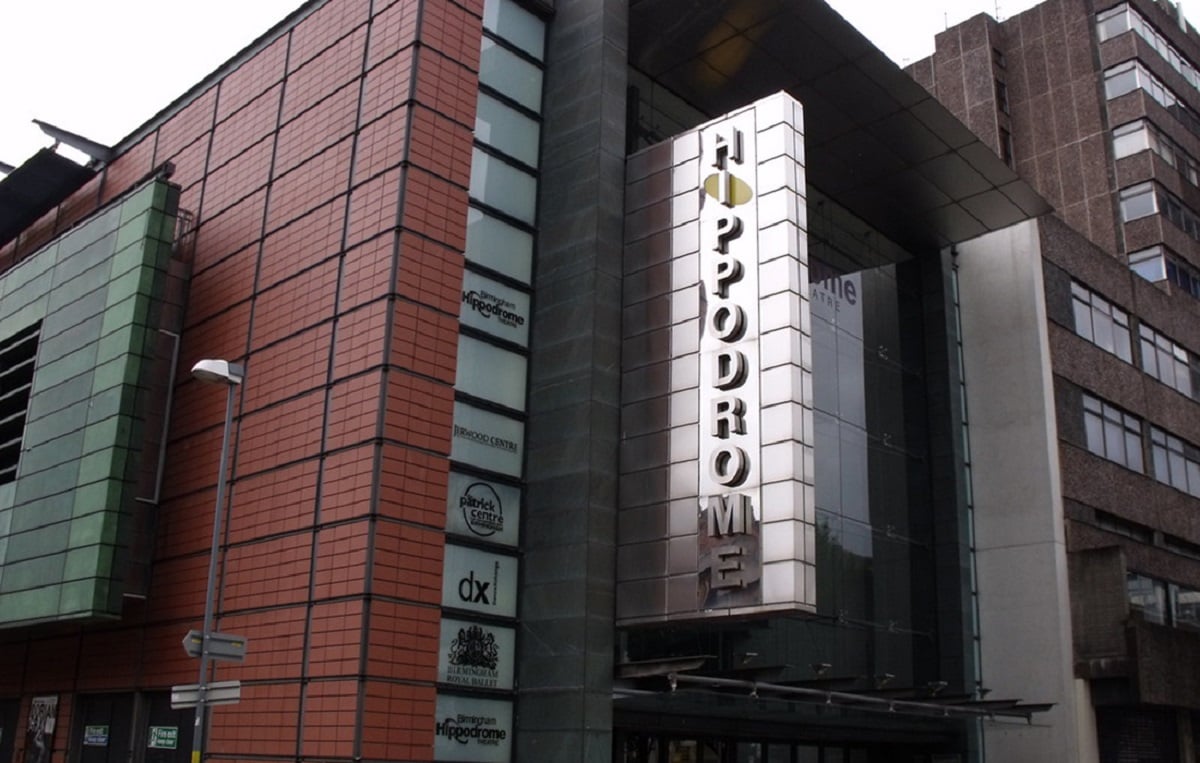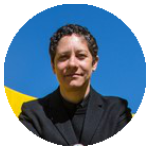
Birmingham Hippodrome was just one of thousands of theatres affected by the pandemic
Photo: ell brown on Visualhunt.com (CC BY 2.0)
12 months of Covid – where next?
Live events in the arts and cultural sector have been among the very hardest hit by the pandemic, so one year on, how do arts leaders feel about this rollercoaster ride? Robert Sanderson asked some of those in the frontline to look back – and look ahead.
With venues closed, arts leaders have been grappling with important existential questions about their work and their futures. Looking back now, how has the focus and purpose of their work changed in response to the pandemic? What have they learned? What advice would they give to their March 2020 selves? And how would they see the future of their work and the wider industry in 2021 and beyond? These are their reflections.
 Fiona Allen, Chief Executive, Birmingham Hippodrome
Fiona Allen, Chief Executive, Birmingham Hippodrome
We focussed on how to reach the communities we serve. We repurposed our main auditorium and foyers to reopen for an immersive digital exhibition Van Gogh Alive; 28,000 socially distanced people came through our doors in timed entry slots.
This year taught me that provided you can stay true to mission – in our case to enrich the cultural life of the region – there are many ways to deliver high quality cultural experiences.
Personally, I would have tried to pace myself better: I really stretched myself very thin in the first eight months of this crisis trying to find answers and solutions that just weren’t there.
We had to ask some fundamental questions: why are we here? What are we for? If we are not a building, what are we? I see us in a transition now to something new and more exciting, where our education, artist development, community and festivals work is considered just as vital as the work we do on our stages.
 Andrew Bolt, CEO, Bridgwater Hall, Manchester
Andrew Bolt, CEO, Bridgwater Hall, Manchester
I’ve not so much learned but confirmed just how interconnected the world and our business really is. My advice to myself would have been to prepare for a cross-country marathon and not a sprint – coming out of the pandemic will be as challenging as working through it. Once the virus is under control, I think the venue industry will bounce back quite quickly. We’ll continue in a changed work environment with a greater acceptance of remote administration and the accompanying role of technology. Travel for meetings will be significantly reduced and environmental sustainability will be a driving factor in this.
 David Clarke, Managing Director, DCA Consultants
David Clarke, Managing Director, DCA Consultants
In some ways, weirdly, everything seems to have sped up. Zoom calls mean that one can be in multiple places and serious meetings one after another and that, coupled with a relay of Government funding calls, means there are demands for us to move faster than ever. Pace yourself. A couple of actually quite tranquil months in lockdown one were followed by a gruelling nine months of absolute slog in which day drifted into evening, weekday into weekend, work into holidays.
Looking back, we should have put structure in place to make this all survivable at a human level. For those with exciting regeneration projects, I think it will be a potentially thrilling ride through the next election. For everyone else, it will be hard scrabble getting our lords and masters to actually care about the ecology of the sector. As is often the case in times of flux, artists and makers will be the most important people – and the most overlooked in terms of their wellbeing and the sustainability of their work.
 Susie Gorgeous, Executive Director, Streetwise Opera
Susie Gorgeous, Executive Director, Streetwise Opera
We work with people who have been affected by homelessness. On 16 March we suspended all face-to-face activities; by 26 March we were running an alternative programme. Between then and the end of August, we ran 93 digital workshops, made 811 phone calls, and engaged with 176 participants online and/or offline.
I’ve learned you have to have a flexible approach to planning! If I could give myself some advice it would be never to underestimate how brave and brilliant people can be. Our performers have been a real inspiration.
 David Hutchinson, CEO, Selladoor Worldwide
David Hutchinson, CEO, Selladoor Worldwide
Our company was moving into immersive and experiential touring theatre when the pandemic first hit. We have continued to focus on this new area of the company. However, the focus coming out of Covid is on single site work which will be more viable in the short term as different parts of the country emerge at different speeds.
Stay calm. Putting aside the huge amount of pain this period has caused, there has been a year of extra development and an opportunity to reimagine the world which, whilst daunting, is a unique opportunity we won’t get again. Try to focus on the opportunities and not just the negatives!
Where retail and other sectors will retreat from high streets, the opportunity is there for theatre and entertainment to step in and reimagine city and town centres, to make culture the driver of regeneration.
 Anton Lockwood, Director of Live, DHP Family
Anton Lockwood, Director of Live, DHP Family
The war won’t be over by Christmas! I suspect the real lessons will come in the next year as things reopen.
I’m hopeful that people have been reminded of the importance and power of live music and that the industry will move to favour flexible independent companies over the big corporates – we’re certainly seeing signs of that in the agent world.
 Stephen Maddock, Chief Executive, City of Birmingham Symphony Orchestra
Stephen Maddock, Chief Executive, City of Birmingham Symphony Orchestra
I’ve learned that the most important skill is not the ability to see into the future and predict what will happen – our world is way too unstable for that – but to be flexible and make quick decisions to adapt to any scenario. This year will remain slow; we will probably go backwards as well as forwards. We are using the discontinuity caused by the pandemic as a chance to change what we do and how we do it. The biggest question now is not just how much of the old normal we can return to, but how much of it we want to return to.
 Elspeth McBain, CEO, Lighthouse Poole
Elspeth McBain, CEO, Lighthouse Poole
The focus has been on getting through each month in a positive frame of mind, with the team well, the cash balance adequate, our resident artists able to work, audiences engaged and funders on board to keep us afloat. The year has also been spent advocating for the sector and the and maintaining high levels of communication with the media. Live performances have been minimal for obvious reasons, so we have found alternative ways to support artists to work, primarily through broadcasting.
I have learned we’re more adaptable than we think and that the sector is strong when we stand together. Collaboration and kindness are vital. On a more practical note: don’t leave the beer store unchecked in a heatwave, make sure the pigeons can’t get into a locked building, and find a coping strategy for being at home with your family 24 hours a day (that isn’t gin or chocolate).
 Jack McNamara, Artistic Director, New Perspectives
Jack McNamara, Artistic Director, New Perspectives
I have learned the possibilities for creating theatrical experiences are endless – and that we explored so few of them before this time. They have brought a new, unimaginable level of accessibility to our work.
If speaking to my March 2020 self I would simply say that the change to our society is in no way short term and to plan for a year or more of alternative forms of theatre. I am excited as I see a huge amount of possibility and innovation going forward. However, there are worries about financial sustainability and our dependence on subsidy. We need to eventually move towards financial models that are self-sustaining.
 Andrew Miller, UK Disability Champion, Arts and Culture
Andrew Miller, UK Disability Champion, Arts and Culture
My role as Arts Disability Champion gained an entirely new purpose. At every stage of the pandemic, the needs of disabled people were neither considered nor prioritised. There was a compelling need for the creation of the UK Disability Arts Alliance and the consequent campaigning and policy impact of #WeShallNotBeRemoved, Press Reset and our Seven Inclusive Principles.
Visibility and volume count. And don't wait for someone else to take the initiative. The scale of reconstruction facing our industry is vast, as are the challenges to achieve inclusion. New rules – and new barriers – are constantly emerging. For example, integrating health data into cultural participation through any vaccine passport could become highly problematic for disabled people and may undermine existing protections in equality and employment law. What's more, any relaxation of Covid prevention protocols in public buildings makes attendance riskier for those groups susceptible to the virus.
 Heather Newill, Managing Director, Arts, Entertainment & Media, Executive Search International
Heather Newill, Managing Director, Arts, Entertainment & Media, Executive Search International
With many talented individuals losing their jobs, we offered a lot more career advice and support in job searches this year than before. The biggest change has been Black Lives Matter, with arts boards at last recognising the importance of investing in diverse talent and representation and changing their recruitment practices to reflect this. We think boards will be more risk averse in their leadership appointments with business/commercial skills and fundraising experience cited as key criteria. The opportunity to restructure will result in organisations aligning their teams to reflect new priorities, for example, a bigger focus on digital expertise or community engagement
 Michael Ockwell, Chief Executive, Southampton Mayflower
Michael Ockwell, Chief Executive, Southampton Mayflower
We have done so much planning and forecasting that is now worthless. I wish we had planned for longer closure and we are now being far more circumspect in our messaging and communications.
I would tell myself to not be so hard on yourself for not knowing the answers. I fear we will be able to open but have no productions to present as there is a lack of understanding around the delicate ecology of our industry. Venues and producers will need to work far more collaboratively in the future and understand the pressures on both sides. Regional theatre will never be more important as our relationship with our audiences is far more developed than in the West End – and funders may finally recognise that.
 Kayte Potter, Owner, Great Leap Forward
Kayte Potter, Owner, Great Leap Forward
As an international tour booker and strategist, the last year has been incredibly challenging. We were finalising a tour of War Horse to Asia so we saw this coming before the British media picked it up. Like everyone else, we cancelled and rescheduled where we could but with different territories emerging from the pandemic at different times, there is no clear map to how to structure a multi-territory tour. Producers and venues are increasingly unable to confirm dates; the earliest we can reasonably consider international touring is the second half of 2022. This year has been mentally and emotionally exhausting.
I would tell my March 2020 self to postpone everything until 2022/2023 and shut the office. In the world of international touring, 2021 will be extremely quiet. If we are lucky, 2022 will be a year of recovery, with a few brave producers with branded shows touring to safer, more highly vaccinated countries. It will be 2023 at least before we can look at the kind of touring we used to take for granted.
 Tajpal Rathore, Artistic Director, Tribe Arts
Tajpal Rathore, Artistic Director, Tribe Arts
Our focus has changed, but our purpose hasn't. We still make work for second and third-generation Black and Asian people, but the pandemic forced us to engage these audiences in a different, safe way. We launched Off/Stage zine, a publication dedicated to Black and Asian theatre and culture, which will likely continue long after the pandemic.
Don't allow a pandemic to stop you dreaming and making! We have been busier and more productive during the pandemic than any other time since our inception. If we've learned anything it's that a global crisis can have a lot of artistic positives.
 Jenny Sealey, CEO and Artistic Director, Graeae Theatre Company
Jenny Sealey, CEO and Artistic Director, Graeae Theatre Company
It has consolidated our belief that Graeae is so much more than a theatre company. It is a company fuelled by the human rights agenda and now we unashamedly own that. In my 24 years at Graeae, I have always been a very office-based director. I now see the value of finding creative headspace. It is OK to work from home, it is OK to go for a walk to clear your head, it is OK to have a day when you feel you have achieved nothing. Tomorrow is a new day. We know we will continue our commitment to digital work alongside any live work because our community will be shielding for a long time. We will need to take theatre to them. This is our ongoing creative challenge.
 Ed Snape, CEO, Fiery Angel
Ed Snape, CEO, Fiery Angel
Even with the advantages of technology, I’ve been overwhelmed by the workload just trying to keep up with pandemic. We are getting involved with more stage to screen projects and we are hopefully announcing a partnership with a cinema/TV distributor very soon. I worry that the West End in particular might take two to three years to fully recover. It's early days but I'm learning that capturing quality theatre is something that audiences are interested in.
 Alistair Spalding, Artistic Director and Chief Executive, Sadler’s Wells
Alistair Spalding, Artistic Director and Chief Executive, Sadler’s Wells
Our purpose – making and sharing dance that inspires us all – hasn’t changed. The pandemic has accelerated our digital plans and capabilities, so there is now even more of a focus on our digital stage than before and on sharing work without audiences needing to physically be in a theatre. We will take the learning from this period to form a balance between live and digital engagement when we reopen.
I’ve learned we can turn things around at very short notice, although I don’t think we’d want to work this way all the time! As well as the challenges of the theatre’s survival, we have had difficult conversations about institutional racism. I have learned that as a leader you should never become complacent but investigate what you can do better – the most important thing is to keep the dialogue open and ongoing.
 John Stalker, Director, John Stalker Productions
John Stalker, Director, John Stalker Productions
I have learned we are a pretty unruly bunch. This crisis has really frightened people working in theatre and built walls around companies and institutions. Theatre producers feel vulnerable and have received little by way of support to regroup and rebuild. This is to the long-term detriment of the industry – if it can be described as an industry anymore. I can’t see any sense of normality returning until 2024 or 2025, by which time we may have lost some theatres and producers. If we believe audiences will return to normal (i.e. pre pandemic levels or behaviours) we are fooling ourselves.
The one thing we haven’t done during this year of lockdown is look seriously at how the theatre business is owned, operated and invested in. The whole thing needs a massive overhaul and I would start with the channels that distribute government subsidy to theatre and the arts.
 Valerie Synmoie, Executive Director, Tamasha Theatre Company
Valerie Synmoie, Executive Director, Tamasha Theatre Company
I don't think the purpose of the work has drastically changed. We have always been focussed on supporting ethnically diverse artists and producing new work that speaks to diverse audiences and we are still doing that – albeit mostly online. The pandemic and the resurgence of the Black Lives Matter movement have really exposed the deep inequalities that exist in society. Our work feels more important than ever so our focus has sharpened.
Personally, the past year has made me more aware of the uncertainties in life and appreciative of the importance of kindness. I've learned that the creative sectors are incredibly resourceful, supportive and generous. Everyone has rallied around, and I think we've all come to really appreciate how much we are all part of a creative ecology – we can't exist without each other. The importance of wellbeing and resilience is something I want to focus on in the coming year. For my team and the artists that we work with it's been a really tough year, so we need to rebuild. Even just getting back to all being in the same room again would be such a positive thing.
 Bengi Unsal, Head of Contemporary Music, Southbank Centre
Bengi Unsal, Head of Contemporary Music, Southbank Centre
We've continued to fulfil our social mission of bringing art to our communities and providing the tonic and escapism through art that our nation has so badly needed. Lockdown has made us step up our existing programmes to reach people who would never have been able to visit Southbank Centre in person. We're really proud of 'Art by Post' and our ongoing series of digital events, 'Inside Out'. As we move forward, the sector should recognise the tangible effect the arts have on people’s lives, their health and wellbeing. This is how we’ll continue to make the economic case for funding in the future.
 Kenny Wax, Vice-President, Society of London Theatre (SOLT)
Kenny Wax, Vice-President, Society of London Theatre (SOLT)
How has the pandemic changed our work? It hasn’t. We are planning to do exactly the same productions that we were doing 18 months ago, just on a different timeline. Having said that, we tried a streamed improv show that was a surprising success. It paid back all the losses of opening in the West End last December and then closing after one week of performances. It will take a long time for the West End to recover because of the need for tourists. I think full houses will be restored more quickly in the regions.
 Alistair Wilkinson, General Manager, Music Beyond Mainstream
Alistair Wilkinson, General Manager, Music Beyond Mainstream
Our focus has shifted from project delivery to an examination of purpose, the value added, and what we care about in this new context. It has been a reimagining, if you will, of what will be different and what we want to be different. Old paradigms are comfortable, but not always worth clinging on to. Get out of your silo and look at the big picture.
This feature has been compiled by Robert Sanderson, who has worked as a volunteer journalist for ArtsProfessional throughout the lockdowns. We will be forever indebted to him for his support, encouragement and expertise which he has shared selflessly throughout.
Join the Discussion
You must be logged in to post a comment.